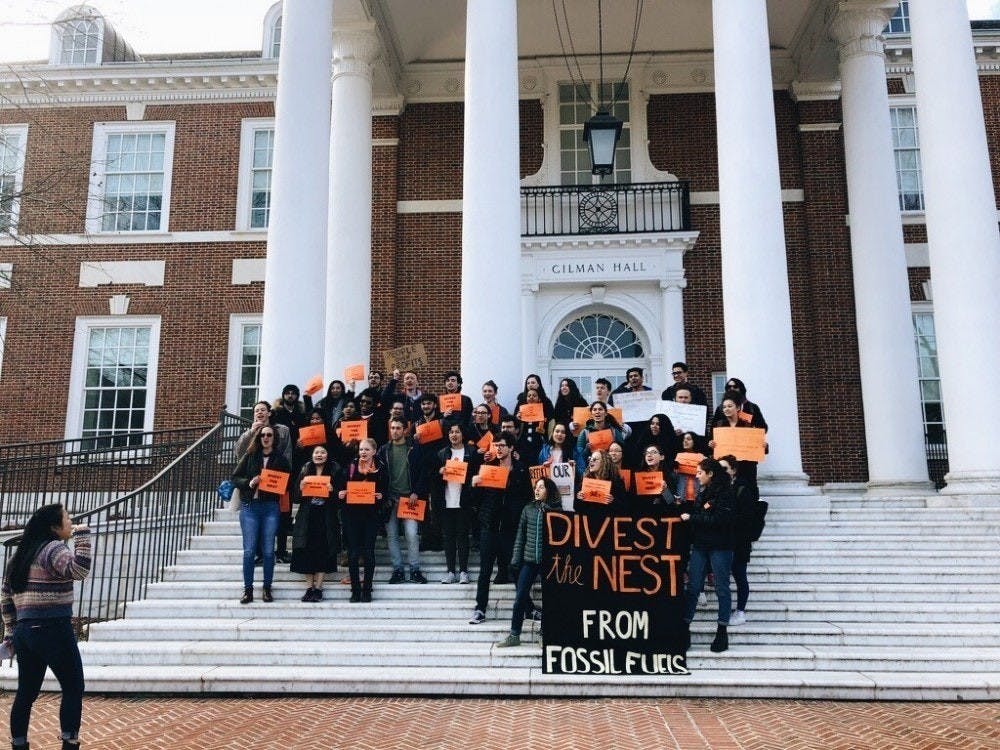On Earth Day, University President Ronald J. Daniels made a few exciting announcements. The University has purchased solar offsets for two-thirds of our energy consumption, created the Sustainability Leadership Council and appointed a new director for our small and underfunded Office of Sustainability.
Overall this is a huge victory for the thousands of Hopkins students that have demanded that the University take climate action, especially since Daniels signed the White House Act on Climate Pledge in 2015. Administrators themselves have acknowledged that these changes were a direct response to pressure from Refuel Our Future, the climate action and fossil fuel divestment group on campus.
However, if Daniels and the Board of Trustees truly want to make Hopkins a global leader in environmental stewardship, the University would divest from all fossil fuels, not just thermal coal. The truth is, Hopkins operates like a corporation, as most universities do. Our endowment has relied on short-term profits from fossil fuels at the expense of students’ futures. Yet as most people already know, the United Nations Intergovernmental Panel on Climate Change (IPCC) released a report in October of 2018 warning that we have 12 years to avoid catastrophic climate conditions by introducing unprecedented changes to our society.
Considering the urgency of the situation, what is the role of U.S. universities and research institutions? Higher education has the responsibility to harness its leadership potential and promote positive social change as these institutions claim to prepare young people for a brighter future. A university’s investment in fossil fuels runs directly contradictory to these aspirations. The University’s investments also directly contradict the goals of our most generous alumni donor, Michael Bloomberg.
In response to the urgent climate crisis, Bloomberg announced last month that he will not run in the 2020 presidential election, choosing instead to devote his efforts towards eliminating fossil fuel use in the US by expanding his Beyond Coal initiative to Beyond Carbon. While we commend his actions, we also ask that Bloomberg follow through on his commitment by calling on Hopkins to fully divest its endowment from fossil fuels. As the University’s largest donor, Bloomberg wields tremendous clout over the actions of the Board of Trustees. In addition to us pressuring the University, we ask that Bloomberg use his influence to push Hopkins to make the leap toward a socially responsible endowment.
The ongoing Garland sit-in has just broken the record for the longest occupation on campus, surpassing the apartheid divestment sit-in in 1986. All of us are inspired by the success of past apartheid and tobacco divestment campaigns where students, faculty and alumni were able to hold their institution accountable. We believe we can do the same to weaken the fossil fuel industry. So far, nine trillion dollars have been divested globally from fossil fuel holdings by institutions, cities like New York City and even the entire nation of Ireland. According to the Guardian, major oil companies such as Shell have cited divestment as a material risk to its business this year.
Although the core group of students who worked to achieve partial divestment have mostly graduated, Refuel Our Future is stronger than ever. Since last fall we have been receiving guidance from the national organization Divest Ed, which is “a training and strategy hub working to resource, vitalize, and broaden the fossil fuel divestment movement.” As a result we are connected with fossil fuel divestment campaigns all around the nation and constantly sharing advice, strategies and tactics in order to be the most effective we can be. We have inspired students from Fossil Free American University to create their own art installation of gravestones depicting what would be lost with climate change, and Fossil Free Yale to create their own pledge against their Senior Class Gift campaign. Refuel Our Future has been helping nearby campuses start their own divestment campaigns. We are also working hard to plan a coordinated national escalation of fossil free campus divestment campaigns for Global Divestment Day in 2020.
Full divestment is the perfect opportunity for Hopkins to become a global leader in environmental stewardship and inspire its peer institutions. Full divestment by a flagship institution like Hopkins would be a tremendous blow to the fossil fuel regime’s legitimacy.
As Hopkins students, faculty and alumni, we have the leverage to hold the University accountable. Fighting for divestment on campus is therefore also a global fight against the industries most responsible for climate change. Sign our online petition, post on Bloomberg’s social media urging him to make a statement and consider joining us in our fight. To support Refuel Our Future’s divestment campaign, come to our meetings (every Wednesday at 7:30 p.m. in Shaffer 300) and message us on Facebook or Instagram to be added to our email list.
The teach-in we organized with Extinction Rebellion U.S. on Earth Day reminded us that we’re headed towards our own extinction if we don’t take immediate and drastic action. The future is in our hands, and the time to act is now.
Elly Ren is a freshman studying Environmental Science and International Studies from Atlanta, Ga. She is a member of Refuel Our Future.

















